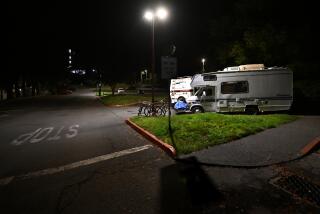L.A.’s Westside -- trouble in paradise
Two years ago, I interviewed a Chinese American woman who had lost her parents during the Depression and was sent to an orphanage in China, where it would be cheaper to care for her. When Japan invaded China, Monica joined thousands of other refugees as they walked hundreds of miles inland, hoping to stay ahead of the fighting.
“To survive, you had to be physically strong, smart and lucky,” Monica told me. “You also had to be emotionally tough. I could always tell who was going to survive as soon I met them. Families that had been really wealthy were spoiled by what they ate, how they dressed and where they slept. They suffered the most, and many of them died on the road. But people like me survived. When you don’t have much, having less isn’t so bad.”
Which brings me to the Westside of Los Angeles. The palm trees still sway in the breeze; the ocean still glistens; people still go to farmers markets, see movies on Third Street Promenade and stroll along Palisades Park. But the downturn has nonetheless hit, hard and deep.
New McMansions built on spec sit empty. Nearly every block on Wilshire, Santa Monica and Montana has at least one empty storefront or going-out-of-business sign. Enter a shop or restaurant that is still open and you’re bound to find a saleswoman or waiter very eager to please, anxiously hoping you’ll buy something.
Last week, a tradesman who’s done a lot of jobs around my house came to my door to ask if I had anything for him to do. He’s not the only one desperate for work. I know an acupuncturist who lost five clients in one week, and a Pilates instructor who lost three clients in a single morning. Too many gardeners, nannies, housekeepers and personal trainers have been let go. They may not live here, but they earned -- and spent -- their money here.
I don’t know a single person who hasn’t been touched in some way by the recession, but this is the Westside, where everyone is supposed to be living the easy life, so the truth is often found hidden in gossip, euphemisms and exaggeration. Have you heard about the Westside private school that’s focusing its fundraising on keeping families in the school? Have you heard that so-and-so is “on sabbatical”? (Meaning someone has lost his or her job.)
I’ve heard people say, “We’ve lost everything,” when that’s not really what they mean. They still have their houses, cars and jobs. But their savings and investments are gone. They’ve lost the cushions that provided security.
Two years ago, Monica told me, “In bad times, some people shrink like rabbits, some run around like chickens, and some step up to the plate.” I’m seeing that now.
There’s a story making the rounds of a matron who was forced to get her first job when her husband lost his. She lasted less than half a day. It seems she was above handing out muffin samples at Williams-Sonoma. I have a friend who made $40,000 last year and lives in a rent-controlled apartment with a fabulous ocean view. She’s furious at “those people on Wall Street” who’ve ruined the country. I’ve heard bitter disappointment: “We did what we were supposed to do. We worked hard and followed all the rules, and this is how we’re paid back?”
Glimmers of fortitude also make the occasional appearance. “We’re lucky,” my sister reminded me the other day. “We know how to live on three quesadillas a day.” I live on the Westside now, but I went to the Salvation Army Nursery School. I know all about being poor.
I’ve even heard fleeting optimism: “At least we don’t live in New York,” an acquaintance confided recently. “We didn’t have to buy a second home in the Hamptons. We already live in paradise.” But not two minutes later, she added: “We’ll never again have good times. All that is over.” I tried to reassure her. When the Depression hit, plenty of people felt the same way she does now, but things turned around eventually. “But it took 70 years!” she shot back. “I’ll be dead then.”
So the chickens and rabbits are here, but there are plenty of others who know how to get by with a little help from rent control, quesadillas and ocean breezes.
Lisa See is the author, most recently, of “Peony in Love.” Her new novel, “Shanghai Girls,” will be out in May.
More to Read
A cure for the common opinion
Get thought-provoking perspectives with our weekly newsletter.
You may occasionally receive promotional content from the Los Angeles Times.






